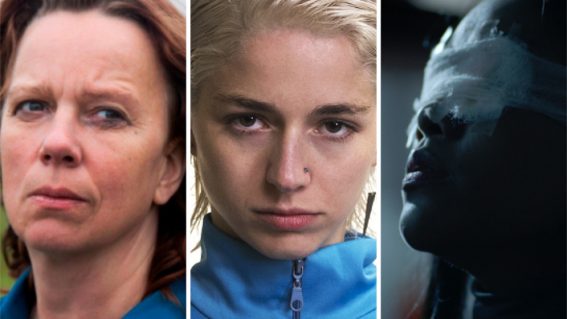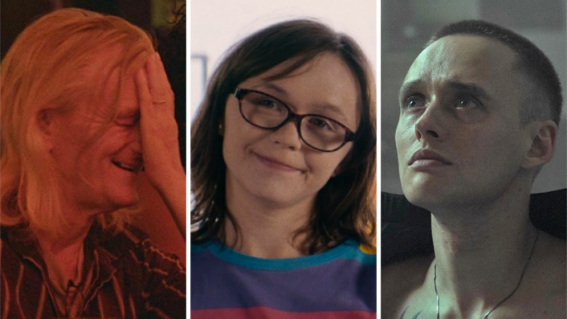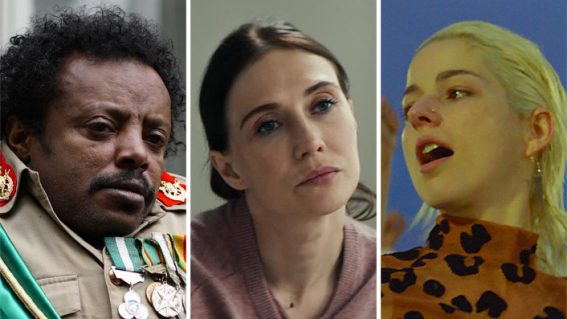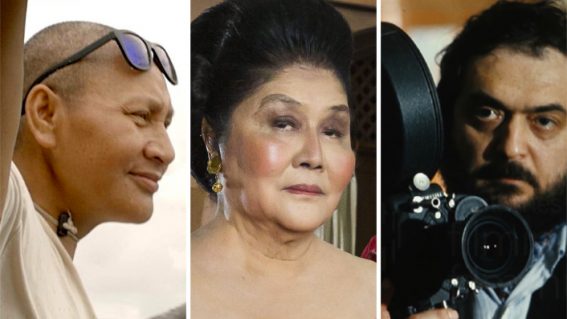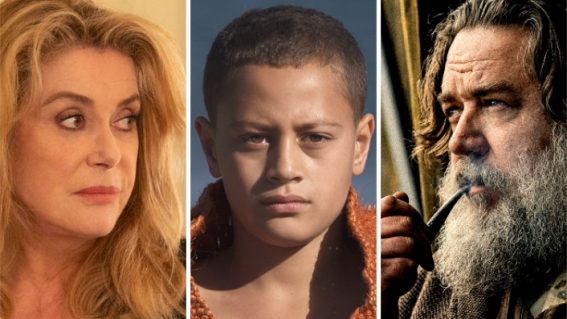NZIFF 2020 mini-reviews (N – R)
Our Whānau Mārama: New Zealand International Film Festival mini-reviews.
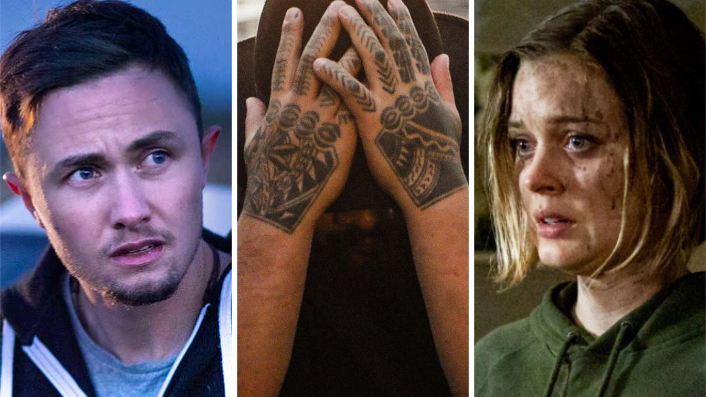
Our writers have been watching a ton of films playing as part of Whānau Mārama: New Zealand International Film Festival 2020.
This year’s festival, streaming online (and playing in select cinemas), from 24 July to 3 August features plenty of gems. Our team of keen viewers has gotten an early look at much of the programming, and we’re here to help make your picks for 2020. We’ve alphabetised our reviews here for your convenience.
All 2020 mini-reviews:
Latest reviews | A – D | E – J | K – M | N – R | S – Z
See also:
* All our Q&As with this year’s filmmakers
* Steve Newall’s early picks from the programme
* Liam Maguren’s early picks from the programme
New Zealand’s Best 2020
Daddy’s Girl by Cian Elyse White – I could’ve watched a whole feature of this father and daughter ribbing each. The actors are so damn funny and the camera frames their actions in a way that highlights the comedy. Then the drama strikes like daggers – painfully, precisely, potently – making excellent use of B&W photography.
Safety Net by Anetha Williams – A frank, confronting, superbly constructed look at guardianship from the perspective of a boy in emergency care limbo. Hell of a turn from young William Best. Could see this one blow up into a feature film.
Daniel by Claire van Beek – A nicely-realised convert setting and a great lead performance from Edith Poor power this short’s exploration into the weird stuff that happens when sexual desires are repressed. Aside from Matt Whelan’s character, who felt a bit unbelievable, this is sharply perceptive filmmaking.
Love is Real! by Calvin Sang – This was fun. A good musical additive to what I hope is New Zealand’s growing collection of anti-rom-coms (think Breaker Upperers). The pacing’s a bit jagged in parts, especially for a film so reliant on song and dance, but it made me smile big and often.
Oranges & Lemons by Robyn Grace – Bound to appeal to those looking for a Kiwi nostalgia blast. From the classicly-dressed schoolroom to the tiny box of raisins inside the little girl’s lunch briefcase, this is a very tidy and attentive production with sublime cinematography. The story seemed a bit bare-bones in comparison.
Pain by Anna Rose Duckworth – Not sure I can review this without bias—I’ve played social indoor sport since I was a child, witnessed White Line Fever far too many times AND dislocated a finger on several occasions—but BOY could I relate. The little girl’s great. I winced several times. Stellar ending.
LIAM MAGUREN
Ngā Whanaunga Māori Pasifika Shorts 2020
Purea by Kath Akuhata-Brown – Meditative as with a perfectly brief running time. Some may consider it a “visual essay” on Māori spirituality and the connection between tūpuna and papatūānuku, which isn’t new ground, but it’s undeniably done here effectively and affectionately.
Forgive Me by Chelsea Winstanley – One of Aotearoa’s producing greats turns in an impressively crafted slab of Farsi drama. Secrets and desires are exposed through nuanced performances and surgical editing choices rather than exposition, a testament to Winstanley’s airtight direction.
Kapaemahu by Hinaleimoana Wong-Kalu, Joe Wilson & Dean Hamer – Drop-to-the-floor gorgeous animation, like seeing wall painting revitalised and immortalised. Appropriate, given how this 700-year-old Hawaiian fable about intersex atua almost got buried in the sands of colonialism. An incredible and vital short film.
Emily by Mark Papalii – Pulls a few too many sorrow cliches in its attempt to depict strength through overwhelming tragedy but Liz Kirkman’s all-in performance helps deliver the drama where it counts.
I am the Moment by Robert George – A fairly intriguing way to approach a documentary biopic. Less interested in talking heads, more dedicated to feeling out Pasifika artist Kalisolaite ‘Uhila’s creative drive while in pre-pandemic Tokyo. Felt like the concept had more legs, but it’s respectable nonetheless.
Money Honey by Isaac Knights-Washbourn – A sharp-looking hangout film that nails the celluloid look with Eoin O’Liddigh’s retro-fitted cinematography, complete with a lovingly-dressed ’90s fish-n-chip shop and some charmingly-written Ed, Edd ‘n’ Eddy-type hustlers.
Gurl by Mika X – A glorious nosedive into Aotearoa’s queer scene of the ’70s with a propulsive production to match. Felt like I knew where the story was going only for Mika X to pull a couple of crafty filmmaking rope-a-dopes. Really good.
LIAM MAGUREN
No Hard Feelings
A textured, intimate heartache of a film from debut narrative feature filmmaker Faraz Shariat and co-writer Paulina Lorenz. Stylish compositions abound, making for a visually kinetic story of queer love set within a community centre for recently arrived refugees. Excellent casting and art direction throughout with a trio of millennial-cusp leading characters that feel lived-in and true makes for one of my top festival picks thus far.
AMANDA JANE ROBINSON
Once Were Brothers: Robbie Robertson and The Band
Based on Robbie Robertson’s recollections, Daniel Roher’s documentary is pretty one-sided. But the dead tell no tales, unlike the roster of A-listers interviewed—from Springsteen to Scorsese, Clapton to Van Morrison. Afficionados of The Band may get hung up on the details, but there are some great archive gems, a sizzling soundtrack, some genuine insights, emotion and laughs aplenty. Sure, it’s subjective, self-centred and self-serving, but it’s a fun ride through one man’s history of The Band, and a fitting last waltz for Robertson.
ADAM FRESCO
Paradise Drifters
A confused, grim look at class precarity with little material of substance, led by three drifters we learn almost nothing about. Cinematographer Jasper Wolf (Monos) does his best to keep this film together stylistically, but narratively it feels totally adrift.
AMANDA JANE ROBINSON
Perfect 10
Eva Riley’s debut feature revolves around Leigh, a sullen 14-year-old gymnast from Brighton who’s lonely days are altered when her older half-brother turns up out of nowhere. Soon Leigh is caught up in her brother’s petty crimes—siphoning petrol and stealing motorbikes—torn between spending time with him and perfecting her floor routine for her first squad competition. Spot-on chemistry from newcomers Frankie Box and Alfie Deegan elevates the film from just another coming-of-age drama into something sincere and stirring.
AMANDA JANE ROBINSON
The Perfect Candidate
I really enjoyed this. It’s funny when it needs to be, the characters are great—and it feels extremely contemporary. Complicated politics are the currents running through this film, whether it be tensions around gender, local council bureaucracy, or religious extremism vs. musical expression. While the themes sound heavy, they are presented as the matter of fact context for the personal story of Maryam, a young doctor who ends up running for council in order to get the road outside her clinic fixed. Def recommend, especially for the election year feels.
RACHEL ASHBY
This second Saudi Arabian feature from director Haifaa al-Mansour, follows young female doctor Maryam (Mila al-Zahrani) as she accidentally (and to almost everyone’s consternation) ends up running for local council. Fascinating in both its stoic detailing of everyday hardline female repression and its joyous celebration of the strength and myriad ways Saudi women find to get shit done, if it occasionally came off a bit soapy, it was balanced out with enlightening cultural insight.
SARAH VOON
Another fascinating slice of Saudi Arabian life from Haifaa al-Mansour, but a very different one than her amazing Wadjda in 2013. While that had a dreamy, often uplifting vibe permeating from its teen protagonist’s personal quest to score a bike, The Perfect Candidate follows a far less idealistic but equally driven adult striving to improve her community. It has a more melancholy vibe, but still offers plenty of hope and beauty amidst its eye-opening insight into the rapidly changing society of Saudi Arabia.
DANIEL RUTLEDGE
Relic
A family-drama-horror very much in the same vein as The Babadook and Hereditary, Relic never quite ascends to the heights of these films. Despite some chilling imagery, spooky moments, and good performances, like a lot of prestige horror, Relic gets too wrapped up in its own clever metaphor to really be very scary. If I want to see a film about the misery of dementia (I don’t) I’ll ask for one, thank you!!!
KATIE PARKER
The real-life horrors of dementia come to the fore in this confined Aussie horror, reminiscent in places of J-horror, a less intensely traumatic Hereditary, and good ol’ haunted house pics. Strong performances at its core convincingly bring three generations of mother/daughter relationships to life, and Relic relishes in unsettling with both the chilling reality of dementia and horror tropes. Walks an interesting line between supernatural spookiness and mental health allegory, the latter especially when the audience is wondering just what’s literally real and what isn’t.
STEVE NEWALL
Featuring a few too many strained visual metaphors for my liking, this is a reasonably predictable haunted house drama that, to be fair, chucks in some very welcome curveballs near its end. A terrific cast and some wonderfully oppressive atmosphere go far, but in a post-Hereditary world, this felt a little thin to me.
TONY STAMP
Taut and brooding Australian Gothic which manages to combine my two biggest fears: getting old and inadequately dry housing. Beautifully shot and centred on lovingly rendered and organic mother/daughter relationships, Relic is let down a little by a heavy-handed last few minutes, still well worth a watch for the moody psychological horror crowd.
AMELIA BERRY
Rūrangi
The best queer stories are told by queer communities: it shouldn’t be something that’s up for debate anymore. However, if you need fodder to prove your point, Rūrangi will do the trick. It’s a generous and heartful story of homecoming and identity led on-screen by the truly electric Elz Carrad as Caz. I would tell everyone to watch this, and I hope we see a second season.
RACHEL ASHBY
Who benefits from our shame? That’s the central question in this deeply touching new web series, exploring queerness, coming home, and what it means to be Māori. You’ll laugh, you’ll cry, you’ll cry again, you’ll cry a third time.
AMELIA BERRY
Super impressed with this affecting, beautifully played drama, introducing some refreshing new talent to Kiwi screens by way of a five-part web series. Newcomer Elz Carrad helms the show, capturing with painful authenticity the colossal struggle transgender people have, dealing with systemic prejudice, depression and familial estrangement. Hitting its stride in episode 2, with intuitive performances from support cast, the camera doesn’t shy away from some achingly sad moments, nor from portraying small-town rural NZ, its occupants and their tribulations with care. Strongly recommend.
SARAH VOON
Hell of a breakout role for Elz Carrad who soaks up the screen in this rich and complex drama that takes a nuke to cliched, cis-splained queer stories. It’s a reunion and redemption story at heart, weaving many current Aotearoa issues admirably (though perhaps not elegantly). Unfortunately, it doesn’t convince me that a web series was the best format for this tale, as its well-written and sturdily-directed dramatic build-ups feel more in place with the long-form pacing of a TV show or fleshed-out feature film.
LIAM MAGUREN
All 2020 mini-reviews:
Latest reviews | A – D | E – J | K – M | N – R | S – Z







